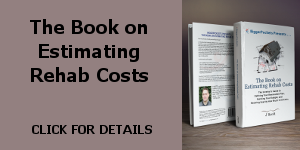Estimating After Repair Value (ARV)
One of the most important aspects of being able to properly and accurately analyze a flip deal is being able to estimate the resale value (the ARV) of the property you are considering. Estimating ARV is a both a science and an art, but you don’t need to be an appraiser or seasoned real estate agent to do it. With some practice, it’s something any real estate investor can do on their own.
Here is a primer you can download and read on this topic:
Enjoy!




Well said and thank you very much. I am curious that you didn’t consider the terms the comps sold for.
I always find that terms are of value BUT hard to adjust for. Please give us your opinion.
Regards
Foster
Thank you for the tutorial J! You touched on geography a bit – distance from subject property to comps – but do you also adjust for positive/negative factors like the property situated on a busy street vs a cul-de-sac, next to a cemetery or commercial/industrial site, etc? If my subject property was on a cul-de-sac, I assume you would probably throw out the comp on a busy street (unless there were very few other comps). If the subject property was on the busy street, do you have any rules of thumb for adjusting a comp on a cul-de-sac down?
Hey Matt,
I’ll typically adjust for the comp if the major difference is geography. For example, if the comp is on a major road and the subject property is not, I may assume a 10% adjustment, as that is pretty typical for a property on a major road. This is the part that is more art than science, and you eventually start to notice trends for things like this. But, there is certainly some guessing that needs to be done, especially at first.
well said! Thanks for this info it’s very helpful.Looking forward for your next post
I agree 100% with everything you wrote, except for the adjustments. That is basically doing what an appraiser does, which unless you are trained as an appraiser, we are not qualified to estimate those types of adjustments., I also think that it is unnecessary.
When we perform comps, we use similar properties (square feet are the same +- 10%) within 0.50 miles that have sold within the last 90 days. We rank them in order (ascending or descending order doesn’t matter) and calculate the average and the mean of the data set. We then calculate the average price per square foot for the data set and multiply that times the square feet of the subject property. We then compare the three amounts: average price, mean price and price based on square footage. 8 times of out 10 the three numbers will be relatively close and we choose the lower of the three. If there are large discrepancies between the three, then we have to understand why in order to make an informed decision of which value to use. So 8 times out of 10 it is purely a calculation, but 2 times out of 10 it becomes an art.
I like the level of detail you use. As a systems person, I really appreciate detailed instructions you provide.
God Bless You!
Michael –
Not sure what you mean that you’re not qualified to do adjustments to determine value (it’s not rocket science, you just need to be familiar with the adjustment amounts used in your area). If you’re using price per square foot, in many cases you’re going to find that you’re way off in terms of value. Per square foot valuation isn’t very accurate — hence the reason appraisers don’t use that technique. If you want to get more accurate valuations, I would suggest either learning how to do the adjustments for find a great real estate agent and/or appraiser to do the valuations for you. And it sounds like you do this for other clients, which is even more reason to ensure that you’re doing it correctly, and not just using per square foot pricing.
It’s funny that you wrote that comment. I was performing comps on a new KB home and there aren’t a lot of similar properties that have closed in the last 90 days. So I had to make the adjustments you referenced in your primer in order to come up comps to use in our model.
I’m big enough to say that you were right and I was short-sighted. I thank God that I read your primer to give me insight. God speaks to us constantly, it’s just a matter of listening and having discernment to filter out the garbage to hear what God is saying to you.
God Bless You!